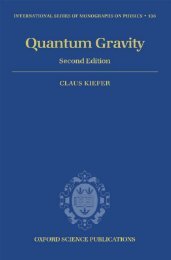Three Roads To Quantum Gravity
Three Roads To Quantum Gravity
Three Roads To Quantum Gravity
You also want an ePaper? Increase the reach of your titles
YUMPU automatically turns print PDFs into web optimized ePapers that Google loves.
POSTSCRIPT 221<br />
But there is a second reason why a positive cosmological<br />
constant is troubling for quantum theories of gravity, including<br />
string theory. As the universe continues to expand, the<br />
energy density due to matter will continue to dilute. But the<br />
cosmological constant is believed to remain stable. This<br />
means that there will be a time in the future when the cosmological<br />
constant comprises most of the energy density in<br />
the universe. After this the expansion will accelerate—indeed<br />
the effect is very similar to the inflation proposed for<br />
the very early universe.<br />
<strong>To</strong> be an observer in an inflating universe is to be in a very<br />
poor situation. As the universe inflates, we will see less and<br />
less of it. Light cannot keep up with the acceleration of the<br />
expansion, and light from distant galaxies will no longer be<br />
able to reach us. It would be as if large regions of the universe<br />
had fallen behind the horizon of a black hole. One by<br />
one distant galaxies will go over a horizon, to a zone from<br />
which their light will never again reach us. With the value<br />
apparently measured, it is only a matter of a few tens of billions<br />
of years before observers in a galaxy see nothing<br />
around them except their own galaxy surrounded by a void.<br />
In such a universe, the considerations of Chapters 1–3 become<br />
crucial. A single observer can only see a small portion<br />
of the universe, and that small portion will only decrease<br />
over time. No matter how long we wait, we will never see<br />
more of the universe than we do now.<br />
<strong>To</strong>m Banks has expressed this principle beautifully. There<br />
is a finite limit to the amount of information that any observer<br />
in an inflating universe may ever see. The limit is that<br />
each observer can see no more than G 3π<br />
2 L bits of information,<br />
where G is Newton’s constant and L is the cosmological constant.<br />
Raphael Bousso called this the N-bound and argued<br />
that this principle may be derived by an argument that is<br />
closely related to Bekenstein’s bound, which is described in<br />
Chapters 8 and 12. The principle seems to be required by the<br />
second law of thermodynamics.<br />
As the universe expands, we would expect that it contains<br />
more and more information. But, according to this principle,


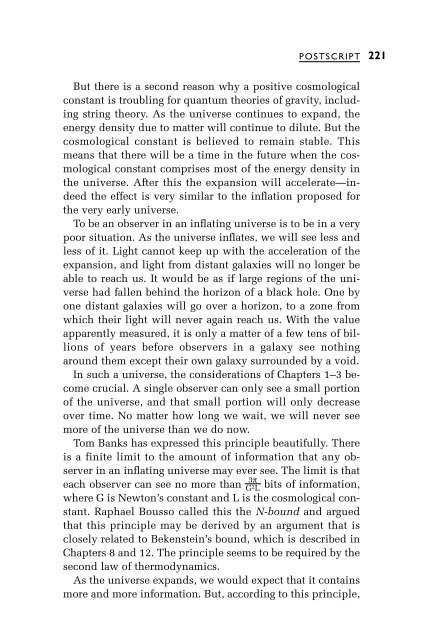
![arXiv:1001.0993v1 [hep-ph] 6 Jan 2010](https://img.yumpu.com/51282177/1/190x245/arxiv10010993v1-hep-ph-6-jan-2010.jpg?quality=85)
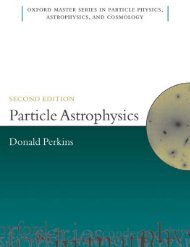
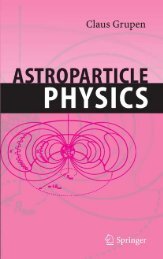
![arXiv:1008.3907v2 [astro-ph.CO] 1 Nov 2011](https://img.yumpu.com/48909562/1/190x245/arxiv10083907v2-astro-phco-1-nov-2011.jpg?quality=85)
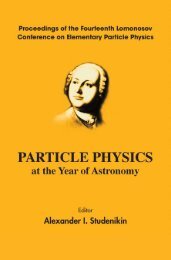
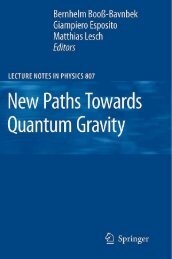
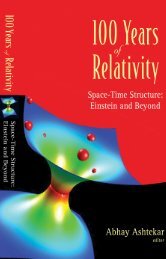
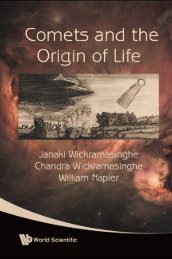
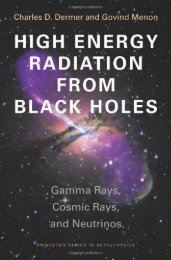
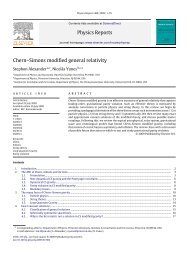
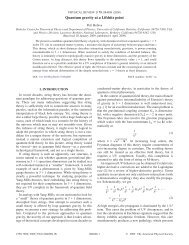
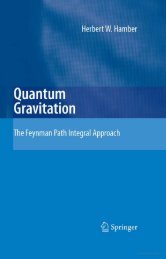
![arXiv:1002.4928v1 [gr-qc] 26 Feb 2010](https://img.yumpu.com/41209516/1/190x245/arxiv10024928v1-gr-qc-26-feb-2010.jpg?quality=85)
![arXiv:1206.2653v1 [astro-ph.CO] 12 Jun 2012](https://img.yumpu.com/39510078/1/190x245/arxiv12062653v1-astro-phco-12-jun-2012.jpg?quality=85)
